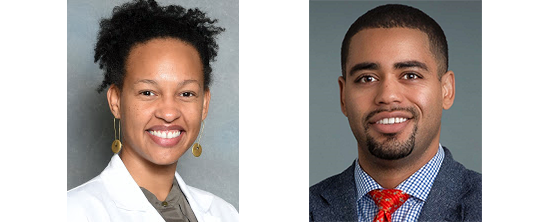
HASC’s Communities Lifting Communities held the latest in a series of Cherished Futures for Black Moms & Babies collaborative events on July 29. A total of 53 hospital, community advisor and strategic partner participants attended via videoconference.
Cherished Futures is an initiative of HASC, Communities Lifting Communities, and the Public Health Alliance of Southern California. The venture advocates for better care and outcomes for Black moms, babies, families, and birthing people.
July’s session took on tough issues related to health equity and systems change that are at the center of efforts now targeting race-based assumptions in health care. Leading the discussion were Michelle Morse, MD, MPH, and Louis Hart, MD — East Coast leaders with strong positions on the issue.
Morse, chief medical officer for New York City’s public health department, has earned wide attention for her work, which unites ”social medicine, and anti-racism education and activism,” summed up Dana Sherrod, MPH, birth equity and racial justice manager at the Public Health Alliance of Southern California, and Cherished Futures project lead.
Recently at Harvard’s Brigham and Women’s Hospital in Boston, Morse led a push to fix flawed data practices that routed Black cardiac patients away from specialized treatment. Her approach embraced critical race theory — the idea that deep cultural assumptions spill over into science and medicine — affecting their assumed objectivity.
“Critical race theory tells us that science is not objective,” Morse explained to July 29 attendees. “Critical race theory suggests that racism actually shapes the very scientific questions we’re asking — and changes how we interpret outcomes.”
Morse pointed to UCLA’s Chandra L. Ford, PhD, MPH, known for her work on race and health care. Ford is professor of community health sciences and founding director of the university’s Center for the Study of Racism, Social Justice & Health.
“She’s one of the leading academics in this (area),” Morse noted. ”She’s there in L.A. with you.”
Following Morse’s calling out of flawed practices at the Boston hospital, she found herself profiled by several national news outlets known for conservative views, she recalled.
Anyone who takes on equity issues needs to be prepared for similar pushback, Morse cautioned.
“(You) really need to be prepared for the backlash and how personal it can be (when your organization adopts these changes) — and how painful,” Morse recalled. ”That’s a huge, huge thing that all of you should be prepared for in your institutional anti-racism work.”
Louis Hart, MD, departing equity program director at New York City Health and Hospitals, followed Morse at July’s event. He seconded her view on flawed, race-based data holding progress back in today’s medical practice.
Now is the time to institute change, he said. Shifts in population mean that yesterday’s minorities are today’s and tomorrow’s majorities – who may long endure diminished outcomes if old assumptions aren’t corrected.
Hart recalled times when computer algorithms produced different projections on kidney function and C-section birth for Black patients versus white and other patients.
“When we give someone different care because the algorithm spits out a different number, we are discriminating against them on the basis of the race,” Hart stated.
“Because of our changing demographics in our country, we need to ensure that these types of inequities aren’t allowed to exist,” Hart underlined. “Because (the harm is) only going to grow, as the amount of people in color in our country continue to expand.”
Momentum for change is building however, as medical and public health professionals continue the work of changing minds.
“Ultimately, we need to see where the culture is at,” Hart summed up. “For your organization, how does the board feel? How does your leadership feel? How do you all feel?”
Hart, now starting a new health equity leadership role at Yale New Haven Health, said examples set by big systems provide powerful incentives for others to join paths of change.
“It’s a lot easier when you… highlight work that’s been done by the New York City public health department, as well as large health systems — it gives it a little more gravitas and credence to the work,” he said.
Also on July 29, attendees explored the issue of trustworthiness, and steps hospitals can take to build connections between hospitals and communities — guided by Adjoa Jones, MBA and Brandi Sims Desjolais, EdD.
The current Cherished Future cohort concludes in December, and we will be welcoming a new, incoming cohort of hospitals and partners beginning early next year.
To learn more or to get involved, please contact CLC President Susan Harrington, and visit the Cherished Futures website at www.cherishedfutures.org.